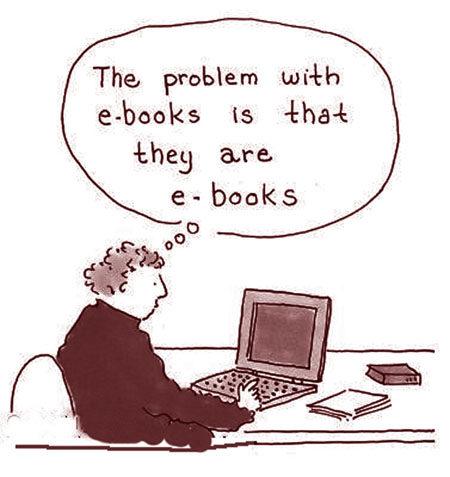平板电脑时代:静心阅读非易事
2012-04-29
Can you concentrate on Flaubert when Facebook is only a swipe away, or give your true devotion to Mr. Darcy while Twitter beckons?2
People who read e-books on tablets like the iPad are realizing that while a book in print or on a black-and-white Kindle is straightforward, a tablet offers a menu of distractions that can fragment the reading experience, or stop it in its tracks.3
E-mail lurks tantalizingly within reach.4 Looking up a tricky5 word or unknown fact in the book is easily accomplished through a quick Google search. And if a book starts to drag, giving up on it to stream a movie over Netflix or scroll through your Twitter feed is only a few taps away.6
That adds up to a reading experience that is more like a 21st-century cacophony than a traditional solitary activity.7 And some of the millions of consumers who have bought tablets and sampled e-books have come away with a conclusion: Its harder than ever to sit down and focus on reading.
“Its like trying to cook when there are little children around,”said David Myers, 53, a systems administrator in Atlanta.8 “A child might do something silly and youve got to stop cooking and fix the problem and then return to cooking. These apps9 beg you to review them all the time,” he said.
For book publishers, who have already seen many consumers convert from print books to e-readers, the rise of tablets poses a potential danger: that book buyers may switch to tablets and then discover that they just arent very amenable to reading.10
Will those readers gradually drift away from books, letting movies or the Internet occupy their leisure time instead?
Maja Thomas, the senior vice president for Hachette Digital, part of the Hachette Book Group, hopes just the opposite occurs. “Someone who doesnt have a habit of reading, and buys a tablet, is going to be offered all these opportunities for reading,” Ms. Thomas said, noting that tablets tend to come with at least one e-book app. “Were hoping they will grow the number of people who will read.”
But there are signs that publishers are cooling11 on tablets for e-reading. A recent survey by Forrester Research showed that 31 percent of publishers believed iPads and similar tablets were the ideal e-reading platform; one year ago, 46 percent thought so.
“The tablet is like a temptress12,” said James McQuivey, the Forrester Research analyst who led the survey. “Its constantly saying, ‘You could be on YouTube13 now. Or its sending constant alerts that pop up14, saying you just got an e-mail. Reading itself is trying to compete.”
Indeed, the basic menu for the Kindle Fire offers links to video, apps, the Web, music, newsstand and books, effectively making books just another menu option. So too with the multipurpose iPad, which Allison Kutz, a 21-year-old senior at Elon University in North Carolina, bought in 2010. She says her reading experience has not been the same since.
She is constantly fending off15 the urge to check other media, making it tough to finish books. For example, in late September 2010, she bought Breaking Night, a memoir about a homeless girl turned Harvard student.16 Ms. Kutz said the only time she was able to focus on it was on an airplane because there was no Internet access. “Ive tried to sit down and read it in Starbucks17 or the apartment, but I end up on Facebook or Googling something she said, and then the next thing you know Ive been surfing18 for 25 minutes,” Ms. Kutz said.
Many publishers believe that the market for both print books and black-and-white e-readers is not going away, despite the pull of tablets.
Voracious book buyers were the first people to latch onto e-readers, prizing them for their convenience, portability and features like text zooming that made it easier for older people to read.19 Now those e-readers are lighter, sleeker20 and cost less than$100—even a cheap tablet is more than double the cost—so techshy consumers who want a device just for reading books and not much else have little incentive to upgrade.21 As long as e-readers remain significantly less expensive than tablets, there may be a market for them for a long time.
For Erin Faulk, a 29-year-old legal assistant and voracious reader in Los Angeles, the era of e-readers has had one major effect: she has accumulated many more books that she categorizes as “DNFs”—Did Not Finish. But she is also buying more books, she said, and she thinks that all the interruptions have, in a way, made her a more discerning22 reader. “With so many distractions, my taste in books has really leveled up23,” Ms. Faulk said.“Recently, I gravitate24 to books that make me forget I have a world of entertainment at my fingertips. If the books not good enough to do that, I guess my time is better spent.”

1. tablet: 文中指平板电脑。
2. 如果Facebook触手可及,你还能专心于福楼拜吗?如果Twitter在一旁召唤,你还会钟情于达西先生吗?Flaubert: 福楼拜(1821—1880),法国作家,认为艺术应该反映现实生活并揭露社会的丑恶现象,重视对生活的观察,强调形式美,代表作为长篇小说《包法利夫人》;Facebook:“脸谱”网站,美国著名的社交服务网站,创始人是马克·扎克伯格;Mr. Darcy: 达西先生,简·奥斯汀的代表作《傲慢与偏见》的男主角;Twitter: 推特,美国的一个社交网络及微博客服务网站。
3. iPad: 苹果公司发布的一款平板电脑,提供浏览互联网、收发电子邮件、观看电子书、播放音频或视频等功能;Kindle: Amazon推出的电子阅读器,屏幕使用了电子墨水屏(electronic paper),使其阅读如同看纸张一般,下文的Kindle Fire是Amazon发布的平板电脑;fragment: v.(使)成碎片,打碎;track: 方向,路径。
4. lurk: 潜伏;tantalizingly: 撩拨人地。
5. tricky: 棘手的。
6. 而如果一本书开始看不下去的时候,扔下书本在Netflix下一部电影,或浏览Twitter的信息,只需要点几下屏幕。
7. cacophony: 不和谐的声音;solitary: 单独的。
8. system administrator: 系统管理员;Atlanta: 亚特兰大(美国佐治亚州首府)。
9. app: 计算机应用程序。
10. convert: 转变;amenable: 易接受指导的。
11. cool: v.(感情、情绪或关系)冷下来,变淡。
12. temptress: 勾引人的女子。
13. YouTube: 全球最大的视频分享网站,公司总部位于加利福尼亚州,网站允许用户下载、观看及分享影片或短片。
14. pop up: 突然出现。
15. fend off: 挡开。
16. memoir: 回忆录;Harvard:(美国)哈佛大学。
17. Starbucks: 星巴克,美国一家连锁咖啡公司的名称,1971年成立,现为全球最大的咖啡连锁店。
18. surf: 网上冲浪,浏览因特网。
19. 如饥似渴的买书者们是第一批购买电子阅读器的人群,他们称赞电子阅读器方便、可随身携带以及诸如字体放大等功能让老年人的阅读更轻松。
20. sleek: 造型优美的。
21. tech-shy: 不喜欢高科技的;incentive:动力。
22. discerning: 有洞察力的。
23. level up: 提升。
24. gravitate: 被吸引到。
